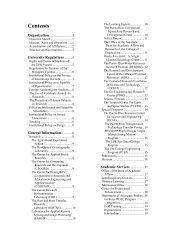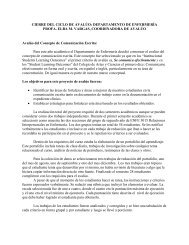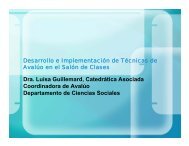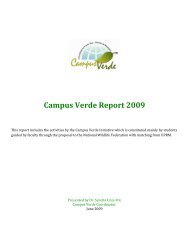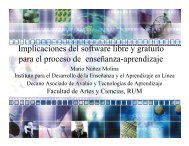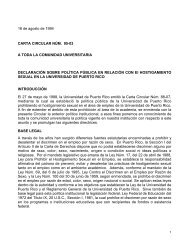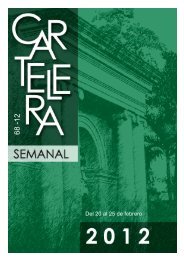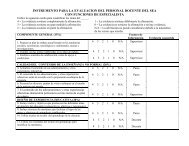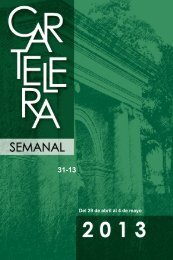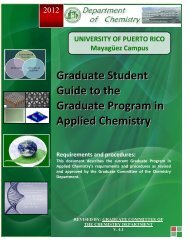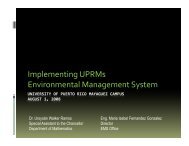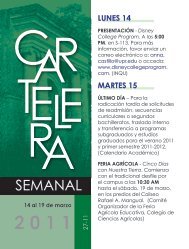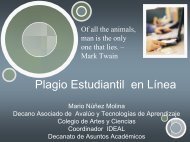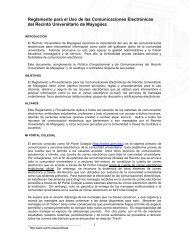Undergraduate Catalogue - UPRM
Undergraduate Catalogue - UPRM
Undergraduate Catalogue - UPRM
Create successful ePaper yourself
Turn your PDF publications into a flip-book with our unique Google optimized e-Paper software.
COLLEGE OF AGRICULTURAL SCIENCES<br />
COURSES OF INSTRUCTION<br />
DEPARTMENT OF CROP PROTECTION<br />
<strong>Undergraduate</strong> Courses<br />
PROC 4006. TROPICAL PHYTOPATHOLOGY.<br />
Three credit hours. Two hours of lecture and one<br />
three-hour laboratory per week. Prerequisite:<br />
BIOL 3435 or BIOL 3417.<br />
Study of diseases of main tropical plants, including<br />
the host range, symptoms and signs, etiology,<br />
cycles, epiphytology, distribution, economic<br />
importance and control.<br />
PROC 4008. AGRICULTURAL ENTOMOLOGY.<br />
Three credit hours. Two hours of lecture and one<br />
three-hour laboratory per week. Prerequisite:<br />
BIOL 4015.<br />
Entomological study from the agricultural<br />
viewpoint, including insects taxonomy, economic<br />
importance, control, methods of collecting,<br />
mounting and preserving insects. A collection of<br />
insects of economic importance is required.<br />
PROC 4016. AGRICULTURAL BACTERIOLOGY.<br />
Three credit hours. Two hours of lecture and one<br />
three-hour laboratory per week. Prerequisites:<br />
QUIM 3002 and CFIT 3005.<br />
The study of the chemical, physical and biological<br />
characteristics of bacteria, associated with<br />
agricultural crops, with emphasis on the basic<br />
techniques employed for isolation, culturing,<br />
identification and control.<br />
PROC 4017. WEED CONTROL. Three credit<br />
hours. Two hours of lecture and one three-hour<br />
laboratory per week. Prerequisites: CFIT 3005 and<br />
QUIM 3002.<br />
Classification and identification of weeds of<br />
economic importance, discussion of physiological<br />
principles related to weed control, and eradication,<br />
commercial herbicides usage and other control<br />
methods.<br />
PROC 4018. INTRODUCTION TO AGRO-<br />
NEMATOLOGY. Three credit hours. Two hours<br />
of lecture and one three-hour laboratory per week.<br />
Prerequisite: BIOL 4015.<br />
PROC 4019. PESTICIDES AND THEIR USE IN<br />
AGRICULTURE. Three credit hours. Two hours<br />
of lecture and one three-hour laboratory per week.<br />
Prerequisite: QUIM 3061.<br />
Studies of pesticides including their chemical<br />
composition, their effects as environmental<br />
contaminants, their mode of action, toxicity and<br />
determination of their residues. Orientation will be<br />
given on management and disposal, methods of<br />
protecting personnel and pertinent federal and state<br />
legislation regarding pesticides usage.<br />
PROC 4025. SUMMER PRACTICUM. Three<br />
credit hours. Thirty hours per week during six<br />
weeks. Prerequisite: Authorization of the Director<br />
of the Department.<br />
Field experience supervised by the Departmental<br />
staff with the collaboration of farmers, private<br />
agricultural industries and governmental<br />
agricultural agencies. A written report will be<br />
required.<br />
PROC 4026. SEMINAR. One credit hour. Onehour<br />
meeting per week.<br />
Review and discussion of the recent literature in<br />
crop protection.<br />
PROC 4995-4996. SPECIAL PROBLEMS. One<br />
to three credit hours per semester. One to three<br />
study and research periods per week. Prerequisite:<br />
Authorization of the Director of the Department.<br />
Study and investigation of a specific problem in the<br />
field of crop protection.<br />
PROC 4997. SUPERVISED PROFESSIONAL<br />
OCCUPATIONAL EXPERIENCE FOR COOP<br />
STUDENTS. Three to six credit hours. A<br />
minimum of two practice periods is required, one<br />
of them in a semester. Prerequisites: Authorization<br />
of the Director of the Department and to be a Coop<br />
Program student.<br />
Practical experience in Crop Protection in<br />
cooperation with the private sector or government.<br />
To be jointly supervised by the academic<br />
department, the Coop program coordinator, and an<br />
official from the cooperating entity. A written<br />
report will be required upon completion of each<br />
work period.<br />
History, morphology, classification, and life cycles<br />
of nematodes, with emphasis on phytoparasitic<br />
extraction from soil and plant tissues.<br />
96 <strong>Undergraduate</strong> <strong>Catalogue</strong> 2004-2005



